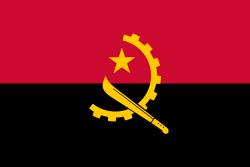This article includes a list of references, related reading, or external links, but its sources remain unclear because it lacks inline citations .(November 2018) |
| Angola at the 1980 Summer Olympics | |
|---|---|
 | |
| IOC code | ANG |
| NOC | Angolan Olympic Committee |
| in Moscow | |
| Competitors | 11 (10 Men, 1 Woman) in 3 sports |
| Flag bearer | Fernando Lopes [1] |
| Medals |
|
| Summer Olympics appearances (overview) | |
Angola competed in the Olympic Games for the first time at the 1980 Summer Olympics in Moscow, USSR.